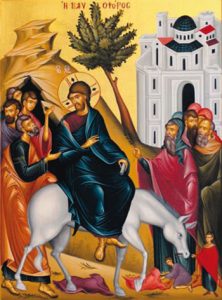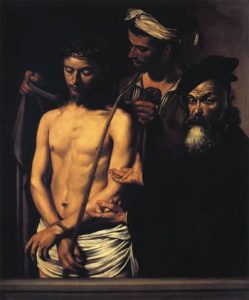Jesus – The Face of God
Palm Sunday
See Readings Sunday 29 March - p27
Today marks a more intense phase of our journey with Jesus to Easter. The Church returns to its earliest memories, namely, the Passion narratives that formed the building blocks of the four Gospels. However, the drama of the Passion should integrate but not override other aspects of today’s Liturgy. To that end, two aspects guide our reflections: Jesus as the full revelation of the Suffering Servant and Jesus’ entry into Jerusalem.
First, a continuous presence on stage – as in the next three days of Holy Week’s readings - is Isaiah’s Suffering Servant. Today’s text shows him as the vulnerable disciple who remains truly obedient (ob audire in Latin meaning to listen intently) even in the midst of his ordeals.
For Paul, Jesus blends both the faithful disciple and the Christ or Anointed One who ‘emptied himself to assume the condition of a slave, and became as men are’ because ‘he did not cling to his equality with God.’ This is rendered alternatively as ‘the rank of Godhead was not a prize to be coveted’ (Knox version) and, again, he ‘did not cling to his prerogatives as God’s equal, but stripped himself of all privilege’ (J.B Phillips). I have also seen it expressed as he did not ‘exploit’ his state as divine.
However expressed, the God revealed in Jesus is one of self-emptying love. It is this divine love that is enacted in the drama of the Passion. Here, God made human did not feel the need to prove anything but only to give everything to the point of death for our sakes. He became one of us so that we can become one with God. In the humanity of Jesus is found the fullness of God. Through him, we too are called to be filled with ‘the fullness of God’ says Paul to the Ephesians. But it is only through our willingness to be ‘in Christ’, to be faithful disciples, to truly listen and, humbly, to be open to what only God can give for us to be our true selves.
God in Jesus, who does not ‘cling to’ or ‘exploit’ his divinity, contrasts with our human parents in Genesis 3. They encapsulate the human urge to be ‘like gods’ by our own efforts. It is the self-deception of trying to be greater than one really is, of trying to prove something. Ultimately, it means striving to be final arbiters of the boundaries of the moral universe (‘knowing good and evil’).
We are created in, and called to grow into, God’s image, not through self-achievement but only through being open to the gift of participating in the divine life. This entails faithfully walking with Jesus through sharing his willingness to listen and to receive. This will mean, somehow, in our own lives, accompanying him in the Passion as it leads to Easter.
Second, today’s opening Processional Gospel tells of Jesus’ entry into Jerusalem. Whatever the admixture of genuine religious fervour or of crowd frenzy, the shadow of the Passion hangs over these events - for Jesus and for us today. This is consonant with the kind of Messiah that Jesus intends to be.
What about Jesus’s state of mind? Jesus sheds tears as he approaches Jerusalem for the final time (Luke 19:41). A few days earlier in Matthew 19:37-9, we find Jesus revealing his affection for Jerusalem and for its people together with something of the disappointment of his ministry. His feelings are captured in a maternal and domestic image: ‘How often have I longed to gather your children, as a hen gathers her chicks under her wings and you refused.’
N.T Wright explains. In a farmyard fire, the hen protects her brood by gathering them under her wings. When the fire is over, the hen may be scorched to death but the chicks survive, protected by the mother’s wings (Jesus and the Victory of God, 570).
Jesus’s image is telling – for those who refused the offer of God’s protection - what that refusal can mean. It is also appropriate, in that Jesus, in his Passion and his journey to Easter, draws the destructive fire of sin and evil on himself, giving himself totally for Jerusalem’s and for our sakes.
These thoughts provide a lens to ponder today’s Passion reading and Eucharist and nourish our faith and our love. Importantly, they anticipate the contrapuntal themes of faithfulness /betrayal in the readings for Monday to Wednesday of Holy Week.
Good Friday:
Awe Wonder and Adoration
Readings
First Reading Isaiah 52: 13 - 53: 12
Second Reading Hebrews 4:4-16, 5:7-9
Gospel Reading John 18: 1-19:42
Our journey has arrived at Good Friday. Let’s pause for a moment.
In terms of prayer, it is interesting that if we look at the Psalms, it is difficult to find one whose dominant theme is Adoration. Consistently we find attitudes of Praise, Petition, Sorrow, and Thanksgiving. We do find a sense of wonder and awe in response to the glories of creation, as in Ps. 8 and 104.
With Adoration, there comes a silence that brings reverence, an urge to bow, to be prostrate before the mystery of God. We are in the presence of what is so far beyond us. The transcendence of God is a dominant aspect of the Islamic tradition.
We find ourselves with the Psalmist in the Office of Readings.
Come in; let us bow and bend low;
Let us kneel before the God who made us
For he is our God and we
The people who belong to his pasture,
the flock that is led by his hand.
Praise and thanksgiving seems to have a natural impulse towards verbal expression, to being shared or communicated with others. Adoration, alternatively, seems to attract an aura of silence, where one is moved to gesture or bodily stance. Adoration perhaps arises when we are lost for words. This is perhaps captured in the Taizé chant version of Adoramus Te Domine.
This brings me to Good Friday. It struck me a few years ago that the Good Friday liturgy appears to revolve around awe, wonder and adoration.
Think of its structure. The entry is in silence. There is no hymn or music. The celebrant prostrates himself before the altar in silence.
What is striking is how today’s first reading portrays the Suffering Servant: before him the crowds are ‘astonished’ and kings stand ‘speechless.’ The first reading from Isaiah is known as the Fifth Gospel in the way that the significance of the Suffering Servant is fulfilled in Jesus’s suffering and death – proclaimed today in John’s Gospel.
The Church’s response to God’s saving actions in Jesus’ Passion and death is expressed, first, in the petition of the Intercessions. Secondly, from here, the movement of the liturgy of Good Friday seems to find its climax in the veneration of the cross and the words ‘Come, let us worship.’
Let’s focus on the readings. As we hear the graphic details of the Suffering Servant - ‘so disfigured as no longer human’ with crowds ‘appalled on seeing him’- what comes to mind is a type of sensory overload that happens to people who witness disaster or death. Some can remember what they heard but not what they saw: others have clear recall of what they saw but can’t recall hearing anything. We even speak of ‘compassion fatigue.’ There comes a point where the human system can’t take any more exposure to pain and suffering. In a way, it shuts down at the level of the five senses and our emotions.
At such moments we can only be still and be silent. We can be traumatized. We are often just lost for words. This seems to be what the Church’s Liturgy is calling us to today - to stand in awe and wonder at what is happening and to whom. Isaiah’s Suffering Servant is fulfilled in the suffering and death of Jesus. The gathering firestorm of hatred and evil finds its target and unleashes all its destructive power onto Him. Jesus crucified is the Victim who embraces and identifies with all victims of history
Again, we get a further (and perhaps novel) glimpse of the face of God from the second reading from Hebrews. Jesus is not simply the Suffering Servant. He is now the High Priest, but not one ‘incapable of feeling our weaknesses with us.’ He is Emmanuel - God with us but in a deeper sense. He is not just High Priest, Emmanuel, Servant, Friend but the divine/human Victim standing in solidarity with all human suffering, desolation, struggles and everyday weaknesses.
Finally, today, Good Friday, Jesus gathers to himself all the Jerusalems, the Judases, the Peters, the Pilates, the Herods, all crucified thieves and imprisoned criminals, the faithful women, the disciples who ran away (can any of us cast the first stone and exempt ourselves?) and, in fact, the whole of humanity and creation. As the heat of human evil and destructiveness intensifies its focus on Jesus, out of the depth of his love, He absorbs and, thus, exhausts its power.
Today, when many people come to worship for their one day in the year, we can all only be still – in awe, wonder and adoration before the crucified God.


 Entries(RSS)
Entries(RSS)